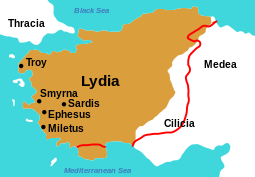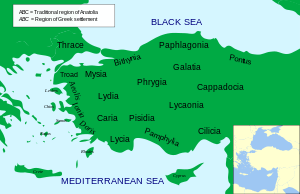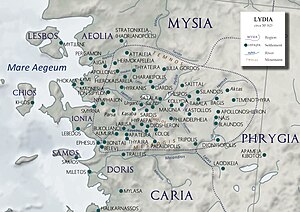Roman province of Lydia
| Lydia (Λυδία) | |
|---|---|
| Ancient Region of Anatolia | |

Map of the Lydian Empire in its final period of sovereignty under Croesus (red lines = 7th century BC extent)
|
|
| Location | Western Anatolia, Salihli, Manisa, Turkey |
| State existed | 1200–546 BC |
| Language | Lydian |
| Historical capitals | Sardis |
| Notable rulers | Gyges, Croesus |
| Persian satrapy | Lydia |
| Roman province | Asia, Lydia |
 |
|
 |
|
Lydia (Assyrian: Luddu; Greek: Λυδία, Turkish: Lidya) was an Iron Age kingdom of western Asia Minor located generally east of ancient Ionia in the modern western Turkish provinces of Uşak, Manisa and inland İzmir. Its population spoke an Anatolian language known as Lydian. Its capital was Sardis.
The Kingdom of Lydia existed from about 1200 BC to 546 BC. At its greatest extent during the 7th century BC, it covered all of western Anatolia. In 546 BC it became a province of the Achaemenid Persian Empire, known as the satrapy of Lydia or Sparda in Old Persian. In 133 BC, it became part of the Roman province of Asia.
Coins are said to have been invented in Lydia around the 7th century BC.
The endonym Śfard (the name the Lydians called themselves) survives in bilingual and trilingual stone-carved notices of the Achaemenid Empire: the satrapy of Sparda (Old Persian), Aramaic Saparda, Babylonian Sapardu, Elamitic Išbarda, Hebrew סְפָרַד. These in the Greek tradition are associated with Sardis, the capital city of King Gyges, constructed during the 7th century BC.
...
Wikipedia
